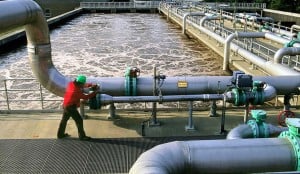
At a special meeting held on the morning of Friday, July 1, Moorestown Council voted to adopt a resolution for the township to enter into an Administrative Consent Order with the state Department of Environmental Protection to address water supply regulatory issues.
Included in these issues will be water allocation and how to best supply firm capacity regulations when undertaking water system infrastructure improvements and related actions. Upon review by township staff and professionals, it was determined prior to the passing of this resolution that doing so would prove to be advantageous to the township.
“Dating back to 2013 to 2015, we’ve been in multiple violations of safe drinking water act. So, while the violations are bad enough, on another level, we’re talking about more than violations,” Councilmember Lisa Petriello said. “We’re talking about credibility, accountability and the possible loss of trust in leadership — and how to do put a price on that?”
The decision to adopt this resolution comes months after township utilities engineer L. Russell Trice recommended the township hire Calgon Carbon to install a pair of carbon filtration tanks to filter and take out the contaminants over an expected period of 12 months. In March, council approved a resolution awarding a contract to Calgon Carbon Corporation for granular activated carbon filters to be used at the North Church Street Water Treatment Plants; however, they did not have approval by the NJDEP at the time for the temporary treatment solutions.
As a result, Township Attorney Anthony “Tony” Drollas Jr. said the township would not do anything without the NJDEP’s approval, and Moorestown has been in contact with the NJDEP since, leading up to the request for the ACO.
“We can sit here and we can debate as long as we want about the findings, but the bottom line is this is about public health and safety,” said Petriello, who admitted she had no problem signing the resolution. “We have to do better going forward.”
During the public comment portion of the meeting, residents voiced both criticism and support in response to the proposed resolution prior to its signing. Resident Danielle Brodecki raised a number of concerns regarding the completeness of the document, citing numerous locations throughout the text where she believed vital information was missing. She questioned whether council members agreed with the document as it was currently presented.
“Of course, the way this document is written, there are bases for information to be added and they will be added,” Drollas said. “That’s not ‘changes to the document.’ We know that. So, if that’s your point, all that type of information that calls for additional information will be added.”
Following Brodecki’s concerns, resident Kati Angelini, owner of Kati’s Kupcakes and a member of the Moorestown Water Group, questioned if there will be a task force to monitor the progress of the water situation, to which the council responded no. However, Councilmember Manuel Delgado said he met with approximately 30 to 40 members of the town to discuss the water situation and to help guide his decision-making.
“I also see a member of council not here. I would think that this would be a really important meeting for her to be at,” Angelini added in regard to Councilmember Stacey Jordan.
Mayor Phil Garwood, confirmed Jordan was not in attendance due to the nature of her business, but she has received a copy of the ACO.
Now that the resolution has been approved, council members believe it will fix any regulatory issues and come up with a format for dealing with the town’s ongoing relationship with the DEP in a very efficient manner going forward. Wells 7 and 9 at the North Church Street plant will remain closed due to the detection of Trichloropropane until a treatment plan is resolved, and the township will now be looking to the hiring of a firm to help manage the issues of water utilities and treatment.
“The bottom line here is that this document enables us to move forward at a good, transparent pace,” Garwood said.









